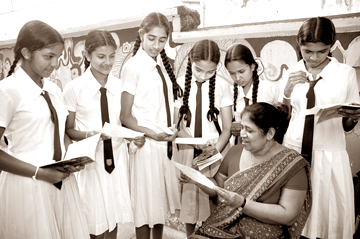|
Developing English language usage in school education
- Part V:
Bilingual education in school system
G. H. ASOKA
The model currently initiated in Sri Lankan school system by the
Education Ministry through circulars address several strong aspects to
achieve balanced bilingualism without devalourization of Sinhala/Tamil.
Addressing child rights and strengthening the national policy on
languages, primary education has been made compulsory in Sinhala/Tamil
in Government schools.
Information Technology
From Grade six, bilingual education is available introducing several
subjects of the curriculum (Science, Mathematics, Health and Physical
Education, Geography, Information Technology and Life Competencies and
Civic Education) to be learnt in English.
 |
|
Future generation should be empowered
with language skills. Picture by Saman Sri Wedage |
This is socially, politically, culturally and economically sound for
learners to maintain their national identity and develop their first
languages. Any number of subjects out of the prescribed can be learnt in
English and all the other subjects in the curriculum are expected to be
learnt in Sinhala/Tamil in Government schools.
Out of the recent educational policies in Sri Lanka on general
education, bilingualism and practices of bilingual education have been
mentioned in the policy proposal of the National Education Commission,
published in 2003.
It reads “Bilingualism should be promoted by using English as the
medium of instruction in selected subjects such as Mathematics, Science,
Technology including Computer literacy, Social Science in secondary
grades, year by year from Grade six, depending on the availability of
teachers. It is expected that students will reach an acceptable level of
proficiency in English at the end of junior secondary education without
jettisoning Sinhala and Tamil which will continue to be the medium of
instruction in selected subjects.”
This policy statement of the National Education Commission needs
modifications highlighting the type of bilingualism and the model
through which the desirable targets are to be achieved through bilingual
education.
Further it is necessary to consider whether achievement of language
competency alone should be the target because bilingual learners are
expected to learn the target input in line with their subjects in the
curriculum while promoting their L2. The report needs to delete the
contradictory ideas, too. It is expected that the Educational Act which
is currently in progress in its development will look into these
aspects.
The Bilingual Education Unit of the Education Ministry and the Unit
of Language Coordination, NIE support the system of education to
implement bilingual education in the school system. The first attempt of
the latter was the islandwide Needs Survey-2007 on bilingual education.
The findings of the Needs Survey conducted by the Language
Coordination Unit, NIE imply that the actual voice of BE program
implemented in Sri Lanka can be appreciated in terms of learners’
positive experience and the stakeholders’ positive attitudes towards it.
Learners’ progress
The latter depends mainly on the observations of learners’ progress
in the use of English in Basic Interpersonal Communication Skills (BICS)
by that time. The program has motivated bilingual learners to learn
English and learn in English. This is a Learner-awakening program to use
and learn English for instrumental purposes despite all the worries and
queries. Therefore, the bilingual education program in Sri Lanka is a
learner-pleasing program with a lot of challenges for all the
stakeholders.
The program has created positive attitudes among all the
stakeholders. It has also been proved that the program is
future-oriented and a positively experienced project only by learners.
It is gender-sensitive because it has attracted more females than males
and it is a rural-community- attracted program.
The proposed suggestions and recommendations of this Needs Survey
address five areas: policy development, administrative aspects, teacher
empowerment, learner empowerment through teacher empowerment and the
need for learning and teaching materials paying special attention on the
supplementary.
The NIE has commenced its teacher and learner empowerment programs
under two sets of national objectives.
Bilingual teachers
The latter is addressed through the former. In 2008, first Teacher
Development Manual-1 on Bilingual Education was introduced and the
second has been developed with three components in 2009 to implement
action research as a way of promoting bilingual teachers’
professionalism from 2010 onwards. Meanwhile supplementary packages
based on self-directed learning are developed as both teacher and
learner supportive materials.
The three year master plan developed by the Ministry reads the target
activities of the Ministry and NIE as a collaborative and collective
effort for promoting bilingual education with the support extended by
the World Bank. Research conducted expect practical suggestions under
realistic findings as a base for development of the target discipline.
In future, the NIE wants to support the Government assisted private
schools, too for implementing bilingual education (wherever it is
preferred to monolingual education in English) in collaboration with the
Ministry. Meanwhile the Ministry has implemented a piloting program to
make monolingual teachers bilingual teachers.
Positive attitudes
The bilingual education program has already been experienced with
learner interest, self-directed learning and positive attitudes of the
majority of the stakeholders in Sri Lanka. Thus implementation of this
program in line with a proper model and a suitable policy for the
country followed by research, a sound teacher empowerment program, a
sound awareness program, effective learner facilitation and
comprehensive material will provide versatile benefits for the country’s
development in every facet. To implement this program successfully in
the country, the NIE seeks support, attention and constructive ideas
based on constructive criticism from everybody at local and
international level.
Concluded
The writer is Chief Project Officer and Head of the Cell of Language
Coordination, Project Leader of Bilingual Education, Faculty of
Languages, Humanities and Social Sciences, National Institute of
Education, Maharagama |



